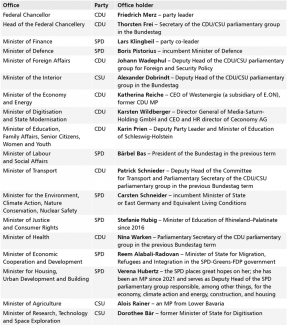Friedrich Merz elected Germany’s Chancellor in the second round of voting
On 6 May, in the second round of voting, the Bundestag elected Friedrich Merz (CDU) Germany’s Chancellor, with the support of 325 out of 630 MPs. The repeated vote was necessary, as for the first time in German history a chancellor candidate failed to secure the required absolute majority in the first round. The CDU/CSU–SPD coalition holds 328 seats, yet Merz received only 310 votes, indicating that 18 MPs from the governing coalition did not support him (the ballot was secret). This is interpreted as a sign of dissatisfaction among some parliamentarians with the results of the coalition negotiations and the cabinet appointments. To allow a second vote on the same day, the agenda had to be amended with the approval of two-thirds of those present. The CDU/CSU and the SPD reached an agreement with the Greens and Die Linke to avoid cooperation with the AfD. Ultimately, all parliamentary groups unanimously supported the change.
The confirmation of the new chancellor only in the second round of voting is considered a defeat for Merz and a sign of his cabinet’s weakness. It also serves as a warning that during his term, he will have to contend not only with strong opposition from the AfD but also with sceptics within the coalition ranks.
Commentary
- The new government commences its work in a weakened condition. The CDU/CSU–SPD coalition will face strong opposition in the Bundestag, as well as dissent within its own ranks. This will complicate the implementation of some parts of the coalition agreement, especially the more controversial ones, such as migration and social welfare policy. Additionally, the need for a swift second vote forced the Christian Democrats, who have formally avoided cooperating with Die Linke since 2018, to abandon that stance. However, Merz could not afford delays or further erosion of his position, as each passing day would have deepened doubts regarding his ability to maintain a majority and govern effectively.
- Merz’s failure to secure a majority in the first round of voting serves as a warning to the leaders of the incoming coalition. This outcome stemmed from discontent among some MPs from both the CDU/CSU and the SPD. The Christian Democrats were critical of the outcome of coalition negotiations with the SPD, especially the fact that the latter party, despite its electoral defeat, was awarded seven ministerial posts, matching the CDU’s share. The new chancellor’s approach also provoked resistance: he bypassed regional party leaders when appointing ministers and failed to consult with them. This discontent was further compounded by criticism of the planned reform of the debt brake (see ‘Agency on credit. Germany releases the debt brake’), which was passed during the previous legislative term but after the election. It drew criticism from some CDU/CSU politicians, particularly regarding its design. Within the SPD, dissatisfaction stemmed from the allocation of cabinet positions the party received, as well as the dominant influence of Lars Klingbeil’s aides (Klingbeil is the incoming Vice Chancellor and Minister of Finance). Former SPD ministers and their supporters expressed frustration over the lack of compensation for the ministries they lost.
- The new government will be determined to implement its agenda, particularly the points related to curbing illegal migration and spurring the economy. However, the CDU/CSU–SPD coalition agreement does not herald a fundamental change of course but rather an adjustment of Germany’s approach to current domestic and international challenges (see ‘Course adjustment: the CDU/CSU–SPD coalition agreement’). Fulfilling the coalition’s objectives will largely depend on the personalities and influence of individual ministers. Both parties have partially opted for figures from outside the political sphere, often with managerial or expert backgrounds. In the case of the SPD, candidates from the younger generation dominate. This is intended to create the impression of a fresh start and emphasise the substantive profile of the incoming cabinet (see Appendix).
- The coalition cooperation between the Christian Democrats and the Social Democrats is expected to be difficult. This is evidenced not only by the challenges in electing the chancellor but also by the growing pressure – on the CDU/CSU from the AfD, and on the SPD from Die Linke and the Greens. A continued lack of improvement in the economic situation could further intensify this pressure. Next year’s elections in the eastern federal states of Saxony-Anhalt (governed by the CDU) and Mecklenburg-Western Pomerania (governed by the SPD) will add further tension. In both instances, polls indicate a possible victory for the AfD.
APPENDIX. The allocation of ministries and their expected staffing






